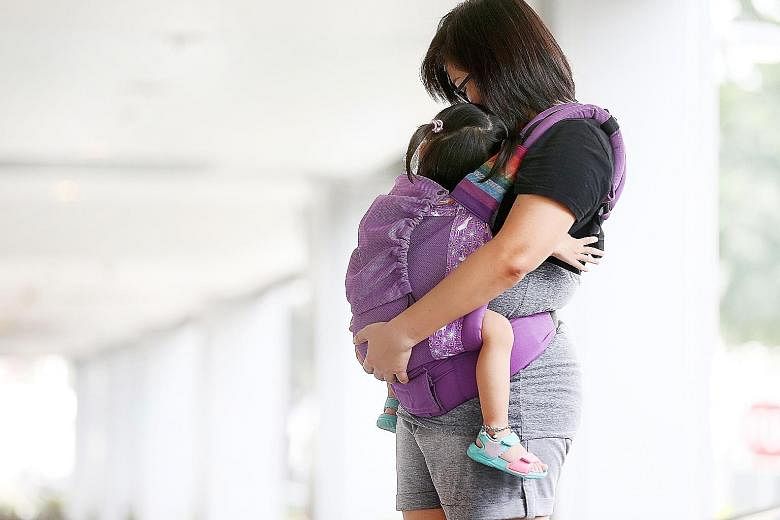Within the month, two-year-old Lorraine Tan (not her real name) will be formally adopted.
She and her adoptive mum will then be treated as any mother and daughter - they will be legally recognised as a family nucleus.
The unique thing about this story: Little Lorraine is not an orphan awaiting a new home. She is a child born out of wedlock who is being adopted by her biological mother.
Her mother, who requested anonymity, started the adoption process last August after seeing mentions of it on a Facebook page belonging to a support group for single parents.
"I saw a post talking about adoption. One woman left a comment saying that she did it for less than $1,000. So I sent her a message and asked her how she did it," said Ms Tan, 38, a civil servant.
She also saw mentions of adoption on the Baby Bonus brochure and on the FAQ pages on taxes.
Unwed parents do adopt their biological children. But that usually happens after they marry a partner who is not the child's parent, and they want him or her to become the legal parent of the child.
-
<$1k
Cost of adoption for Ms Tan, who navigated legal procedures on her own by filing e-litigation papers.
$3k
Minimum amount Ms Tan would have to pay if she had engaged a lawyer.
Cases of unwed parents singly adopting their children are "very few", said the Ministry of Social and Family Development (MSF).
"Our laws do not require them to do so. Some unwed parents may nonetheless choose to do so, for reasons such as to terminate the rights and responsibilities of the other parent," the MSF added.
The Straits Times knows of at least two other mothers doing this, one of whom has successfully concluded her case.
Family lawyer Koh Tien Hua said that this procedure is allowed under the Adoption of Children Act, and it "makes the illegitimate child her lawful child, as if the child was born to her in lawful wedlock".
The move essentially removes the label of illegitimacy without changing the circumstances of the child. Lorraine, for example, will have all the rights of a child born to a married couple.
Currently, the differences between legitimate and illegitimate children are benefits such as housing, housing subsidies, the Baby Bonus cash gift, tax relief for the parent and inheritance priority.
Under the Intestate Succession Act, an illegitimate child ranks behind the spouse and legitimate children when it comes to inheritance.
In Parliament last year, the MSF said: "Parents who want to leave something for their illegitimate child should make a will."
Ms Tan's initial impetus for the adoption was the Baby Bonus cash gift and the Child Development Account (CDA) of up to $6,000, which has since been extended to children of unwed mothers born from September last year.
"That was the push factor. But when I started the journey, I noticed more benefits," said Ms Tan.
Top of her list was that Lorraine's biological father - who is married and does not want to acknowledge the child - would have to give up all ties to the girl.
"So in future, he cannot turn around to claim against her," she said, referring to the Maintenance of Parents Act.
The adoption costs less than $1,000 for Ms Tan, who navigated the legal procedures on her own by filing e-litigation papers. Engaging a lawyer would have set her back between $3,000 and $5,000.
Experts said allowing an unwed mum's adoption to change the legitimacy status of a child is like making them jump through hoops.
In recent years, Singapore has moved to equalise benefits for children of unwed parents.
Most recently, those born this year to unwed mothers will have 16 weeks of maternity leave instead of eight weeks previously.
The MSF said: "Government benefits that support the growth and development of children are given to all Singaporean children, regardless of their legitimacy status."
Lawyer Ivan Cheong said unwed mothers are more likely to initiate an adoption for personal reasons rather than benefits since issues such as inheritance can be dealt with by writing a will, which will cost under $500.
He added: "From a layman's view, it sounds very artificial."
Women's rights group Aware called the process of "labelling children as illegitimate" absurd.
Law professor Leong Wai Kum has long called for this label to be removed. In a 2011 paper, she wrote: "With our evermore enlightened view of appropriate legal protection of children, it is incontrovertibly unsuitable."
Family lawyer Sim Bock Eng pointed to the Women's Charter and how both parents are obligated to maintain the child - legitimate or not. She added: "It may be more productive to focus on the parent-child relationship as opposed to the relationship between his parents."
Unwed mothers like Ms Tan may find it "silly and ridiculous", but she said she would do anything for Lorraine's benefit.
She and her daughter now live with Ms Tan's parents in her brother's marital home.
Once the adoption goes through, she plans to buy a built-to-order flat in her and her daughter's names so that the child's future is secure even when Ms Tan dies. She said: "I have to protect my daughter's interests."


